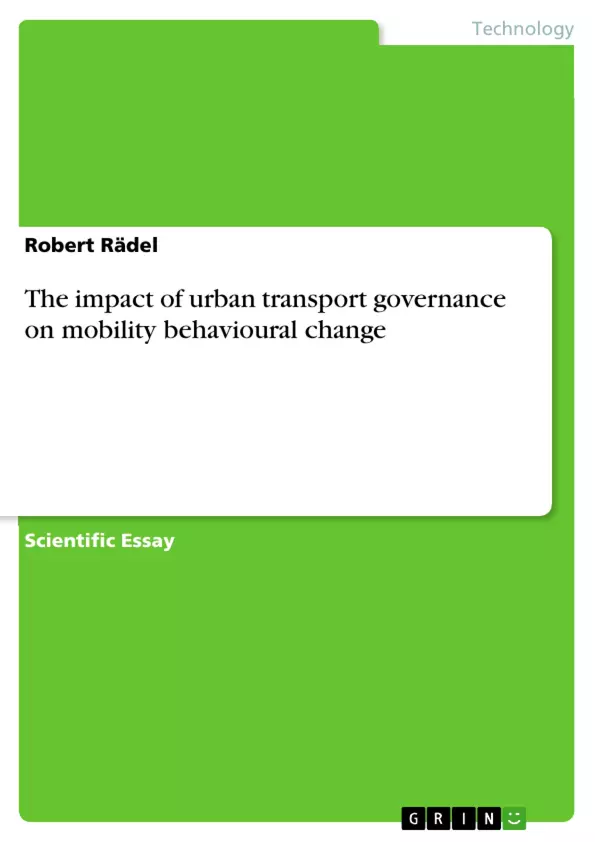Political decision makers often shy away from implementing policies that could affect mobility behavioural freedom. In order to support or replace a cost-intensive “material” measure, mobility management campaigns addressing subjective determinants are realized, to set psychological incentives for behavioural change. However, whereas infrastructural or supply activities are well investigated, the causal effects of persuasive measures on the mobility behaviour are obscure. Moreover, the interrelations of indirectly effecting political factors and socio-spatial inequalities are a “black box”. So the central research question should be to identify causal effects in the urban governance arrangements on the mobility behaviour of different social groups and in certain city districts.
The state of research in transport politics or policy is whether moderate or related to other topics like demography, economy, social politics or planning. However, a new developed concept of “mobility culture” on urban level opens research impulses, which can be linked to the regional governance analyses of political science.
The presented methodological approach is to investigate with different methods on two levels. On the city level it could try to identify decisive governance factors on mobility behavioural change, by applying a combined expert interview and questionnaire with a statistical analyses of three household mobility surveys in the last 10 years. Parallel and on the level of single policies it could conduct its own panel questionnaire with control groups, complemented by guideline-oriented qualitative interviews. The final objective is to produce general statements on the effects and interrelations of “citizen-oriented” urban transport governance.
Inhaltsverzeichnis (Table of Contents)
- Summary
- Research Questions and Objectives
- State of Research
- Transport Politics, Transport Policy and Transport Planning
- Urban Mobility Culture and Transport Governance
- Environmental Psychology and Mobility Behavioural Research, Mobility Management
- Theory and Hypotheses
- Methodological Access and Research Design
- Bibliography
Zielsetzung und Themenschwerpunkte (Objectives and Key Themes)
This dissertation project investigates the causal effects of urban governance arrangements on mobility behavior. The research aims to understand the relationship between political decision-making and changes in how people move around in cities, particularly considering different social groups and specific urban districts.
- The influence of urban governance on mobility behavior
- The impact of transport policies on different social groups
- The effectiveness of “soft” measures like mobility management campaigns
- The role of mobility culture in shaping urban transport practices
- The interplay of political decisions and socio-spatial inequalities
Zusammenfassung der Kapitel (Chapter Summaries)
The dissertation explores the challenges of influencing mobility behavior through policy interventions, particularly in the context of urban transport. The research highlights the difficulties of implementing restrictive measures that might impact individual freedom and the complexities of evaluating the effectiveness of “soft” measures like mobility management campaigns.
- Research Questions and Objectives: This chapter introduces the central research question, which aims to identify the causal effects of urban governance arrangements on mobility behavior. It also outlines the key objectives of the study, including understanding the impact of different transport policies on various social groups and evaluating the effectiveness of mobility management measures.
- State of Research: This chapter provides an overview of existing research on transport politics, policy, and planning, highlighting the scarcity of studies examining the relationship between urban governance and mobility behavior. It also introduces the concept of "mobility culture" and its relevance to urban transport governance research.
Schlüsselwörter (Keywords)
This dissertation examines the impact of urban transport governance on mobility behavioral change, focusing on the effectiveness of different policy measures, the role of mobility culture, and the influence of socio-spatial inequalities. Key concepts include urban governance, transport policy, mobility management, mobility culture, and socio-spatial inequalities.
Frequently Asked Questions
What is "urban mobility culture"?
Urban mobility culture refers to the specific set of values, behaviors, and political frameworks that shape how transportation is perceived and used in a particular city.
How does urban governance influence mobility behavior?
Governance arrangements, including political decisions and policy implementation, create incentives or barriers that influence whether citizens choose sustainable transport over private cars.
What are "soft" measures in transport policy?
Soft measures include mobility management campaigns, information, and psychological incentives aimed at changing subjective determinants of behavior without changing physical infrastructure.
Why are socio-spatial inequalities important in transport research?
Transport policies affect different social groups and city districts unequally; understanding these interrelations is crucial for creating fair and effective urban governance.
What methodology is used to investigate mobility behavioral change?
The research applies a mixed-methods approach, including expert interviews, household surveys, and panel questionnaires with control groups.
- Quote paper
- Robert Rädel (Author), 2013, The impact of urban transport governance on mobility behavioural change, Munich, GRIN Verlag, https://www.grin.com/document/282328



